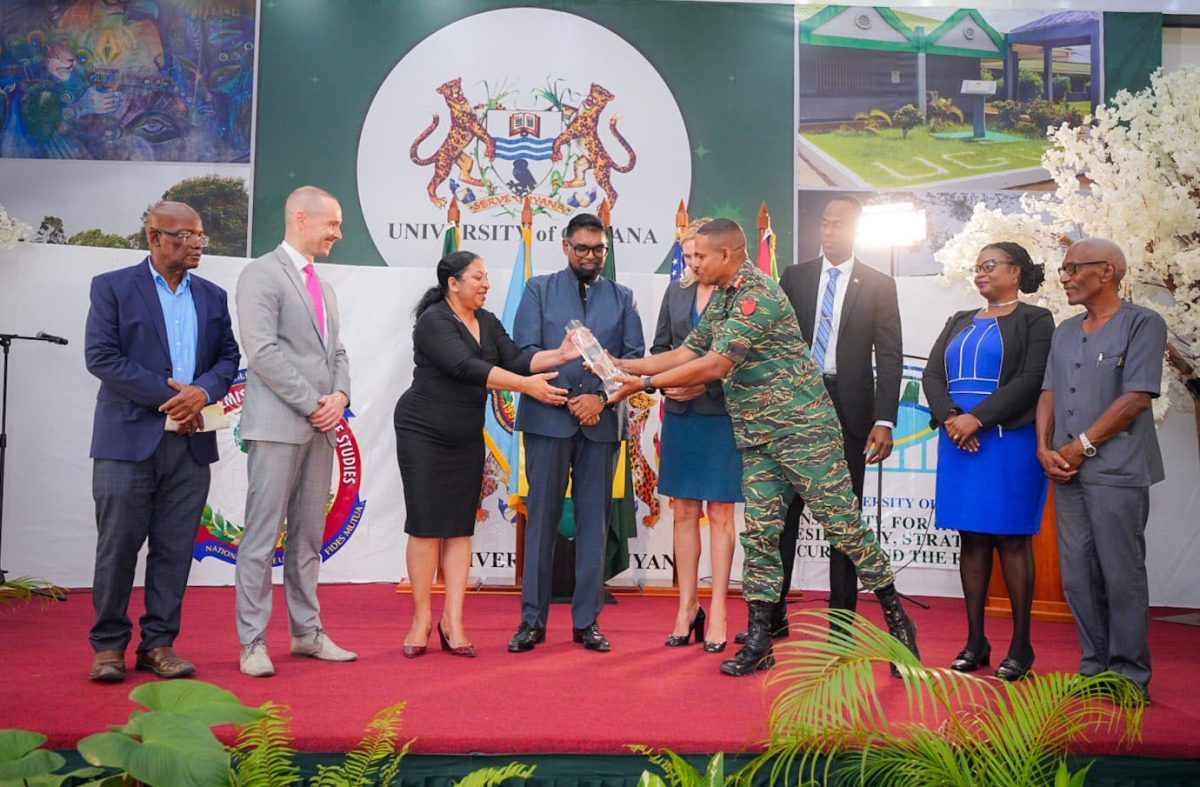The government will be developing a National Defence Institute (NDI) at the University of Guyana with the aim of it becoming a premier security institution in the region.
This announcement was made by the Commander-in-Chief, President Irfaan Ali while delivering feature remarks at the university’s Turkeyen Campus yesterday where its Institute of Human Resiliency, Strategic Security and the Future (IHRSSF) received the 2023 Perry Centre for Hemispheric Defense Studies Award for Excellence in Security and Defense Education, an Office of the President release stated yesterday.
Also present at the event were Chief of Staff of the GDF, Brigadier Omar Khan; National Security Advisor, Captain Gerry Gouveia; and the United States Ambassador to Guyana, Nicole Theriot.
The President also expressed the desire for extending the collaboration between UG, the Guyana Defence Force (GDF) and the United States’ Perry Centre for Hemispheric Defense Studies.
“Now I also want to say that this partnership, and this is definitely a partnership, it’s a true partnership. It’s about positioning us as a country, as a university and we want to position Guyana and the University of Guyana and then the National Defence Institute as a premier regional security institution where, not only persons within CARICOM, but we are looking beyond CARICOM; we’re looking at Brazil as a major stakeholder, and why not even personnel from Venezuela to be part of our security infrastructure from an institutional perspective, from a training perspective.”
According to the release, the President stressed that the NDI would aid the security development and positioning of Guyana, while promoting the university as a central hub for security training.
“So, we want to see this extended and Guyana being positioned, and the University of Guyana being positioned as a central hub for security, security training, and also the bringing together, the integration, of our leaders across the region in terms of security management and leadership, defence leadership.”
Cyber and port security
President Ali took the opportunity to spotlight several issues and challenges that the region currently faces and emphasised that more focus must be placed on cyber and port security.
“We’ve seen over the last two years how intense the threat is becoming. The cyber threat is real. We have seen the information and misinformation campaign during the tensions with our neighbours. We have seen the CARICOM website being hacked and their information platform exposed to all elements.”
He made the observation that since ports around the country are being modernised and are expanding at a rapid pace, port security must be enhanced.
“Port security is not cameras and men. You know, people believe that for some reason. It is advanced information gathering. It is strategic analysis. It is understanding who are using our ports and why they are using our ports. It is understanding the global transport and logistics hub. It is understanding the threats within the global transport and logistics hubs. Those are some of the things that the port security entails. So we are going with a massive programme on port security. So those are two subset programmes I think that the University of Guyana can work with the Perry Centre in developing a module around,” the president said.
President Ali also spoke about a number of other issues and challenges that the region faces in its security architecture, including the prevalence and increase of gang violence, creating and fostering children-friendly ecosystems, defence diplomacy, artificial intelligence (AI), and digitisation. He also urged stakeholders to consider topics surrounding hemispheric defence in the Caribbean Examinations Council (CXC) curriculum.
“I would like us to have the lead, before the end of this year, in building out the curriculum, building out the teaching modules. We will do the entire package and hand it over to CXC so that they can introduce this in the secondary school system, and students can choose this as an elective. The fundamentals in hemispheric security will allow them an early introduction to how complex security matters are and how important it is… in the structure of society and the building out of society.”






